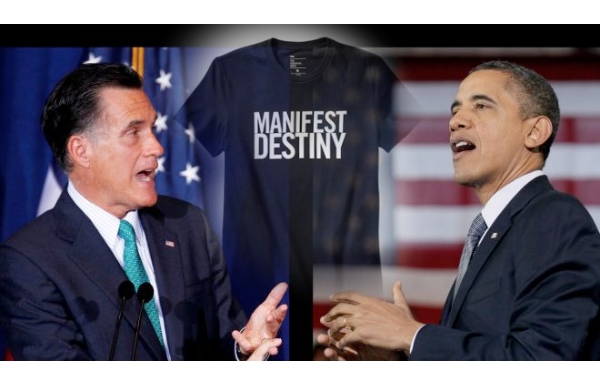
Elections 2012: Manifest Destiny is a Topic for Monday Debate

A T-shirt with the words “Manifest Destiny” became an instant cause in Indian country recently and especially on Social Media. Thousands of people told The Gap that the shirt was outrageous and should be pulled from the shelves. The campaign was successful, the clothing company responded, the designer apologized, and the shirt is no longer sold.
But Manifest Destiny is still the centerpiece in American thinking about the world. It’s topic one in tonight’s debate between President Barack Obama and Republican challenger Mitt Romney.
The term “Manifest Destiny” was first used by John O’Sullivan, editor of The New York Morning News, writing in 1845 to justify conquest of American Indian lands in the West. “Away, away with all these cobweb issues of rights of discovery, exploration, settlement, continuity, etc. … And that claim is by the right of our manifest destiny to overspread and to possess the whole of the continent which Providence has given us.”
But that was only the name “Manifest Destiny.” The idea had been around since Europeans first crossed the ocean.
Tonight’s debate is in Florida and the topic is international affairs. Fitting. In 1818 Andrew Jackson invaded Seminole Country in violation of international law. His army murdered civilians, destroyed villages, killed Seminole warriors and their African-American allies, and executed two British citizens for “inciting and arming” the Indians. A few years later Florida was United States territory.
The idea of conquest was present long before the phrase “Manifest Destiny.” Thomas Jefferson had the same basic thought when he described America’s role as an “Empire of Liberty.”
No politician today would dare call for “Manifest Destiny.” But that same idea will surface tonight cloaked in the politically correct version, “American Exceptionalism.” (Although that phrase actually predates “Manifest Destiny.”)
One of the planned topic areas, probably the first one, is how the two candidates see America’s place in the world.
There will be two different answers both in terms of style and substance.
Critics of President Obama say that, at his core, he does not believe in this premise. The evidence is a 2010 speech where the president said: “I believe in American Exceptionalism, just as I suspect that the Brits believe in British exceptionalism and the Greeks believe in Greek exceptionalism.”
But Obama also said in that same speech, “I’m enormously proud of my country and its role and history in the world.” And, he continued, “I see no contradiction between believing that America has a continued extraordinary role in leading the world towards peace and prosperity and recognizing that that leadership is incumbent, depends on, our ability to create partnerships because we create partnerships because we can’t solve these problems alone.”
But that version of American Exceptionalism doesn’t fit Romney’s definition. “I think it’s fair to ask, you know, what is it that explains the absence of any discernable foreign policy from the president of the United States? And I believe that it flows from his fundamental disbelief in American exceptionalism,” Romney said on a talk show last year. “In the President’s world, all nations have common interests, the lines between good and evil are blurred, America’s history merits apology. And without a compass to guide him in our increasingly turbulent world, he’s tentative, indecisive, timid and nuanced.”
The very idea of nuances are opposite Manifest Destiny. The idea that God has ordained a particular kind of American power. Or as it was called during the pre-war build up to an invasion of Iraq, American Hegemony.
American Hegemony justified the Iraq war and the threats that Romney makes to Iran. One of the questions tonight: Is Romney even open to talking with Iran in order to prevent war.
At the Citadel military college in September, Romney used language that would have matched any 19th century Manifest Destiny speech.
“This century must be an American Century … America has the strongest economy and the strongest military in the world. In an American Century, America leads the free world and the free world leads the entire world,” he said. “God did not create this country to be a nation of followers. America is not destined to be one of several equally balanced global powers. America must lead the world, or someone else will. Without American leadership, without clarity of American purpose and resolve, the world becomes a far more dangerous place, and liberty and prosperity would surely be among the first casualties.”
Obama’s view is quite different. He outlined this in a 2010 National Security Strategy. “The burdens of a young century cannot fall on American shoulders alone. Indeed, our adversaries would like to see America sap our strength by overextending our power,” the president said. The power of the country comes not from its military strength but from its people. “Our long-term security will not come from our ability to instill fear in other peoples, but our capacity to speak to their hopes.” That idea, Obama argued, still requires American leadership.
So as you watch, listen, or tweet about tonight’s debate consider what the two candidates are saying – spoken words or not – about Manifest Destiny, American Exceptionalism or the American Century.
Mark Trahant is a writer, speaker and Twitter poet. He is a member of the Shoshone-Bannock Tribes and lives in Fort Hall, Idaho. He has been writing about Indian Country for more than three decades. His e-mail is:marktrahant@thecedarsgroup.org.
Read more:http://indiancountrytodaymedianetwork.com/2012/10/22/elections-2012-manifest-destiny-is-a-topic-for-monday-debate-141374 http://indiancountrytodaymedianetwork.com/2012/10/22/elections-2012-manifest-destiny-is-a-topic-for-monday-debate-141374#ixzz2A4XmAUyi